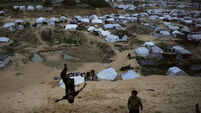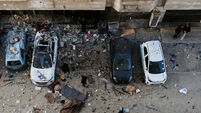Famine in Gaza is almost here. The world needs to act now

Palestinians gather to receive aid outside a UNRWA warehouse. To avert catastrophic hunger, urgent measures need to be taken to facilitate large-scale aid delivery of food and other aid. Photo: REUTERS/Mahmoud Issa
A major report published on Monday has confirmed our worst fears. 70% of people in northern Gaza are on the brink of famine.
Following almost six never-ending months of constant bombardments, restrictions of aid and mass forced displacement, an official declaration of famine is only a matter of time. To avert catastrophic hunger, urgent measures need to be taken to facilitate large-scale aid delivery of food and other aid.
















